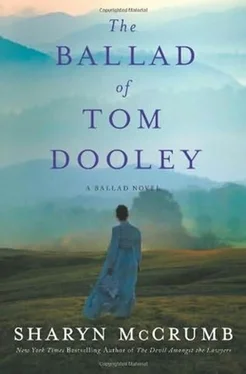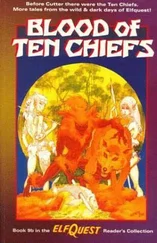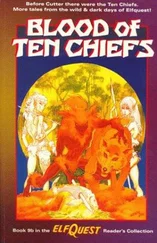“I don’t know if you know who I am,” I said to Laura.
She nodded. “Yes. You have the look of the Fosters, I reckon, but I had already heard tell you was working over to the Meltons’ place, so I’d a-knowed you anyhow. Not too many strangers about. Leastways, not females.”
She didn’t seem put out to see me, and I wondered if she had heard the gossip about me and Tom, and whether she cared about it or not. Best not to speak of it right away. “I envy you your home and family, Cousin, for I have none.”
She shrugged. “The house is rented, and as for family, I’d as lief give you some of ours, for they are no end of trouble to tend to, night and day. Trying to take care of it all killed my mama.”
“I thought I’d heard that the baby there was the cause of her passing.”
Laura glanced over at the cradle, where the small assassin slept in peace. “She was worn out, anyhow, and birthing that last child took more strength than she had. I doubt not she was glad to go, in the end.”
I mustered the smile I use when I have worked out the right thing to say. “I’m sure it eased her passing to know that her brood was left in your loving sisterly hands.” I didn’t believe any such thing, but I thought it might please her to hear it said.
“Well, I hope I do my best.” Laura looked away and scowled as one of the younger boys ventured into the room. “What is it, John? Get along to bed now! I’ve no mind to fool with you this evening.”
“I’m still hungry, Sister,” he said, in a treble voice, on the verge of tears.
Laura sighed and shook her head. “There’s cold biscuits in the tin plate in the pie safe. Get you one, and mind you don’t make a mess with the crumbs in your bed, for I’ll not change it.”
The boy snatched his biscuit, and crept away past us. When he had gone, I turned back to my scrawny cousin, beaming in pinchbeck admiration. “Why, all this responsibility for home and children will serve you well when you have a husband and a home of your own.”
Laura took up the poker and stirred the fire. “I reckon it will.” She didn’t seem none too cheered by the sentiment. “But for the War, I’d have been wed long ago, but now there’s scarcely enough men to go around, though my spinsterhood is not for want of trying. I reckon I could have set my cap for a fat old widower, but that wouldn’t be no different from staying here.”
“It can’t be as hopeless as that,” I said. “After all, you are only just past twenty now, and the War is over, so it may not be long before somebody makes you a bride. I hear tell you have a sweetheart.”
She turned on me, still holding the poker, likely forgetting she had it in her hand, but she looked like she’d spied a snake. “What have you heard?”
I laughed. “Oh, not a word about a fat old widower, Cousin. I hear tell that a handsome young soldier is paying court to you.”
She sat back down on the stool, and the firelight made shadows on her ashen face, but there was no trace of the pleasure a girl usually shows when you tease her about a beau. She sighed. “Oh, I reckon you’re talking about Tom Dula. When Daddy caught us together, I knowed it would get about. Well, Tom is fine to look at, and he is one for sport, right enough, but what would he do with a wife?”
“Why, take her home to the Dula farm, of course. His mother still lives there, but what of that? The rest of the Dula young’uns will be out and gone before too long, and old Miz Dula won’t last forever.”
“No. But our cousin Ann will. At least it will seem like it to me.”
“Ann Melton? Why would she come into it? She has a husband already.”
“Some say she has two, and she seems likely to keep them both.” Her lip curled, and she twisted a hank of her broom-straw hair. “Don’t you wish you were beautiful, Pauline?”
It hurt to be reminded so matter-of-factly that I was not, but I never flinch when I have been stung. “Well, Cousin, if beauty would give me a golden palace to live in, meat and whiskey every day, and servants to do my bidding, I would welcome it, but I cannot see that beauty has given our lovely cousin any more than the lot of an ordinary plain woman: a dull husband and a middling farmstead. Where is the wonder in that?”
Laura shrugged. “More than I ever got, or you either. But it may yet come right for me. There’s somebody else who is sweet on me. Folks around here wouldn’t think him even as good as that no-account Tom, but leastways he would be proud to have me.”
That was the first interesting thing that drab little cousin Laura had said. “Well, who is your suitor then, missy? A bald old farmer or a cripple home from the War?”
She shook her head. “I mustn’t say. We cannot have it known. But what about you then, Pauline? Do you have a sweetheart waiting for you back up the mountain?”
“Yes, and his name is legion. I have come down here to get cured of my love sickness. Pox. The wages of sin, folk tell me.” I had Cousin Laura’s measure by now. She kept to herself, not that she had much choice living so far out from the settlement, and she wasn’t the type to tell tales. She was sitting on her own secret like a broody hen, and so I entrusted her with mine-not that I cared anymore who got to know of it. The damage was done, I reckoned.
“I’m very sorry for your trouble,” Laura said primly, in a voice so soft I could hardly hear her.
I reckon she was shocked by what I’d said, because her eyes got big, and she leaned a little away from me, like she was a-skeered she might catch it from me. I did not bother to tell her that, like as not, she already had.
I made notes about the case at the time, not because I ever intended to make the details public, but simply because a lawyer must keep track of his cases, and this one stretched out for so many months, while I went on about my life in Charlotte, that I had need of documentation to keep it in my mind. Perhaps I had some thought of turning it into a memoir, for a good deal of my own history intrudes into the story. When all is said and done, more people will be interested in me than in him, poor fellow. I might have kept my own story and thrown out his, if I’d ever had the leisure to pen my autobiography.
I do not know that these jottings do me much credit, but I saw no reason to alter them for posterity. I have told the truth about worse things, so let the story stand as I recorded it at the time.
October 1866
I have just returned from a visit to my client, Thomas P. Dula. Tom Dooley (to employ the local vernacular) is a likely-looking lad, a fellow Confederate veteran, and a poor mountaineer born in a Carolina log cabin. I was all those things myself once. But there, I assure you, the resemblance ends. Dula is a more handsome man than I ever was, and I doubt he will ever have the opportunity to run to fat as I fear I am beginning to, but, aside from that, all the advantages lie with me.
I was appointed by the presiding judge to defend the prisoner, but since it is a capital case, the poor fellow’s fate does not rest in my hands alone. North Carolina in her wisdom requires that defendants on trial for their lives must be represented by two members of counsel. Mr. Dula had three: myself, Captain Richard Allison, and Robert Armfield. I wondered if the logic behind the multiple-attorney rule was akin to the tradition used in firing squads, of loading one gun with dummy bullets, so that each man may believe that he had no hand in the killing of the prisoner. With three of us attending to Thomas Dula during the trial, the guilt of the loss is shared amongst us. Thus I hope to use some legal maneuvering to snatch victory from the jaws of defeat.
Читать дальше












